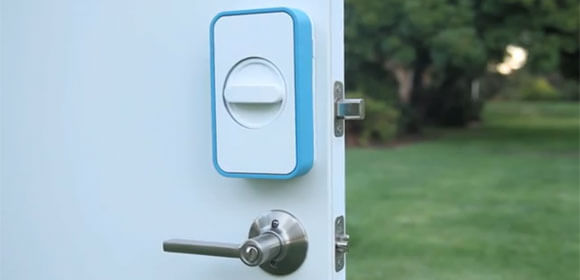The smartphone is quickly becoming the 21st century Swiss army knife.
Beyond being able to make calls, send messages, play games, and surf the web with it, both Google and Apple have enabled devices to replace the wallet, by storing credit and store cards, coupons, rewards cards, tickets, and boarding passes. Rumors are even circulating about adding in IDs, such as driver’s licenses.
But what about the sharp, pointy metal keys in the other pocket? Keyless door entry for cars has been standard for years — now Agipy Inc. has announced Lockitron, a device that fits over a door’s deadbolt allowing you to unlock your door with your phone. Because Lockitron uses Wi-Fi and is Internet connected, you can open the door remotely for visitors or grant them access using their phone number or email address.
Lockitron works with a variety of phones, but it shines with smartphones. The device is NFC compatible so swiping an Android smartphones near the lock can unlock it directly. But the coolest feature uses Bluetooth 4-enabled smartphones (like the iPhone 5) to unlock the door automatically as you approach it without even getting your phone out.
That’s true keyless, secure entry at a $149 price point.
Instead of replacing the deadbolt altogether, which is what the original version was, the new device mounts on top of the interior part of the deadbolt and mechanically lock and unlocks the door. Because it fits over the top of the deadlock, it can be used by homeowners or renters. If the power goes out, you can still use old-fashioned keys to get in. The device runs on AA batteries, which will notify you when they need to be replaced.
The founders of Agipy put together a nice video explaining all of these features as part of a call for preorders so that full production can begin:
To date, over 11,000 preorders have been placed for a total of over $1.7 million committed, which is over 11 times the amount that the founders were asking for. Even though the initial batch target was only 1,000 units with a delivery date of March 2013, demand was so high that it was bumped up to 9,000, which have already sold out. A second batch has been scheduled for May.
With three weeks left to preorder, there’s no telling how far this campaign will go.
Now, you may have noticed the Kickstarter-like pitch of this video. That isn’t a mistake. In fact, the company’s preorder landing page for its website looks almost identical to a Kickstarter page. The likeness was so similar that Daniel Odio, CEO of AppMakr and Socialize, gave a thorough breakdown of the Lockitron launch page on his blog and showed why it is a borrowed, yet brilliant design.
So why does the page look so akin to Kickstarter? CEO of Lockitron Cameron Roberson put up a post on TechCrunch to spill the beans: the project was initially rejected by the crowdfunding site. This was due to some bad timing submitting their project as the site revised its policies, then subsequently announced that “Kickstarter Is Not A Store” in response to recent negative press regarding failed projects. While they could have gone to Indiegogo as other rejects projects have, they opted to launch their own.
That was a huge gamble a few weeks ago, but now it looks like utter brilliance. Who wouldn’t want to have a similar million-dollar crowdfunded success as other smartphone-compatible devices, like the Pebble watch, but not have to pay Kickstarter its 5 percent and Amazon Payments 3-5 percent if the project succeeds?

Lockitron’s story is now an ongoing two-pronged tale, one part concerning its doorlocking hardware and the other gauging the success of its DIY crowdfunding approach. Both are innovative and forward-thinking, serving as an inspiration to would-be startups everywhere. On top of that, this success story shows just how palatable crowdfunding has become to the Internet masses.
The rising popularity of electronic doorlocks isn’t really surprising, considering that hotels have used electronic card readers for years and keypads on doors are fairly old school. Other companies are adapting remote control car keyfobs to unlock doors, but these haven’t seemed to capture the public’s interest. Lockitron’s solution is much more straightforward because it doesn’t employ keypads or cards, but the all-in-one smartphone that people are already carrying around.




